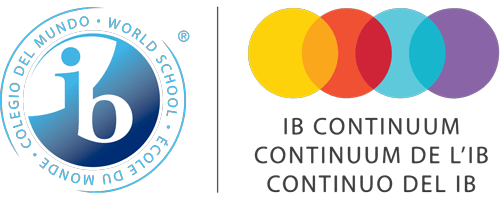Each of the four IB programmes provides a detailed and developmentally appropriate curriculum or curriculum framework that is broad, balanced, conceptual and connected. IB programmes offer students access to a broad and balanced range of academic studies and learning experiences. They promote conceptual learning, create frameworks within which knowledge can be acquired, and focus on powerful organizing ideas that are relevant across subject areas and that help to integrate learning and add coherence to the curriculum. The programmes emphasize the importance of making connections, exploring the relationships between academic disciplines, and learning about the world in ways that reach beyond the scope of individual subjects. They also focus on offering students authentic opportunities to connect their learning to the world around them.
IB Diploma Programme
The first IB programme, the Diploma Programme (DP), was established in 1968. It sought to provide a challenging yet balanced education that would facilitate geographical mobility by providing an internationally recognized university-entrance qualification, but that would also serve the deeper purpose of promoting intercultural understanding and respect.
The IB Diploma Programme (DP) is an academically challenging and balanced education program with final examinations that prepare students aged 16 to 19 for success at university and life beyond. It has been designed to address the intellectual, social, emotional, and physical well-being of students. The programme has gained recognition and respect from the world’s leading universities.
The Diploma Programme prepares students for effective participation in a rapidly evolving and increasingly global society as they:
- develop physically, intellectually, emotionally, and ethically
- acquire breadth and depth of knowledge and understanding, studying courses from 6 subject groups
- develop the skills and a positive attitude toward learning that will prepare them for higher education
- study at least two languages and increase understanding of cultures, including their own
- make connections across traditional academic disciplines and explore the nature of knowledge through the programme’s unique theory of knowledge course
- undertake in-depth research into an area of interest through the lens of one or more academic disciplines in the extended essay
- enhance their personal and interpersonal development through creativity, action, and service.
Curriculum: DP subject groups
IB DP students must choose one subject from each of five groups (1 to 5), ensuring breadth of knowledge and understanding in their best language, additional language(s), social sciences, experimental sciences and mathematics. Students can choose another subject from group 6 by choosing a subject that is not chosen from groups 3 and 4. At least three and not more than four subjects are taken at higher level (240 teaching hours), while the other subjects are taken at standard level (150 teaching hours). Students study and take examinations in English.
Diploma Programme Core
Made up of the three required components, the DP core aims to broaden students’ educational experience and challenge them to apply their knowledge and skills. The three core elements are:
1. Theory of knowledge develops a coherent approach to learning that unifies the academic disciplines. In this course on critical thinking, students inquire into the nature of knowing and deepen their understanding of knowledge. It is assessed through an exhibition and a 1,600-word essay. TOK is part of the International Baccalaureate® (IB) Diploma Programme (DP) core and is mandatory for all students. The TOK requirement is central to the educational philosophy of the DP.
TOK is composed almost entirely of questions into different kinds of knowledge. The most central of these is “How do we know?”, while other questions include:
- What counts as evidence for X?
- How do we judge which is the best model of Y?
- What does theory Z mean in the real world?
Through discussions of these and other questions, students gain greater awareness of their personal and ideological assumptions and develop an appreciation of the diversity and richness of cultural perspectives.
2. The extended essay asks students to engage in independent research through an in-depth study of a question relating to one of the DP subjects they are studying.
The extended essay is a required component of the International Baccalaureate® (IB) Diploma Programme (DP). It is an independent piece of research, culminating with a 4,000-word paper. The significance of the extended essay:
- practical preparation for undergraduate research
- an opportunity for students to investigate a topic of personal interest to them relates to one of the student’s six DP subjects
Through the extended essay’s research process, students develop skills in formulating an appropriate research question, engaging in a personal exploration of the topic, communicating ideas, and developing an argument. Participation in this process develops the capacity to analyse, synthesize, and evaluate knowledge.
3. Creativity, action, service (CAS) is one of the three essential elements that every student must complete as part of the Diploma Programme (DP).
Creativity, activity, service (CAS) involves students in various activities alongside their academic studies throughout the Diploma Programme. Creativity encourages students to engage in the arts and creative thinking. The activity seeks to develop a healthy lifestyle through physical activity. Service with the community offers a vehicle for new learning with academic value. The three strands of CAS enhance students’ personal and interpersonal development through experiential learning and enable self-discovery journeys.
It is not formally assessed. However, students reflect on their CAS experiences as part of the DP and provide evidence of achieving the seven learning outcomes for CAS. Students can collect evidence in the following forms: photographs, videos, short movies, composing, blogs, written reflections, art performances or exhibitions, writing poems or songs, social media and channels, etc.
For further information about the Diploma Programme
* Irmak Schools has been an official member of the Diploma Programme (DP) of the International Baccalaureate Organisation since 10 May 2023. This certifies Irmak Schools as an international school providing education at international standards. With this achievement, we are proud to share that our school has become an IB Continuum School.




